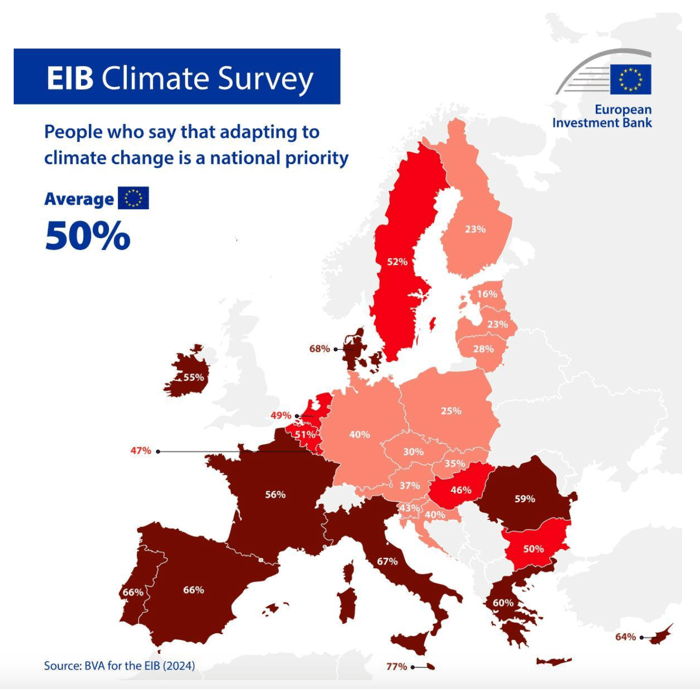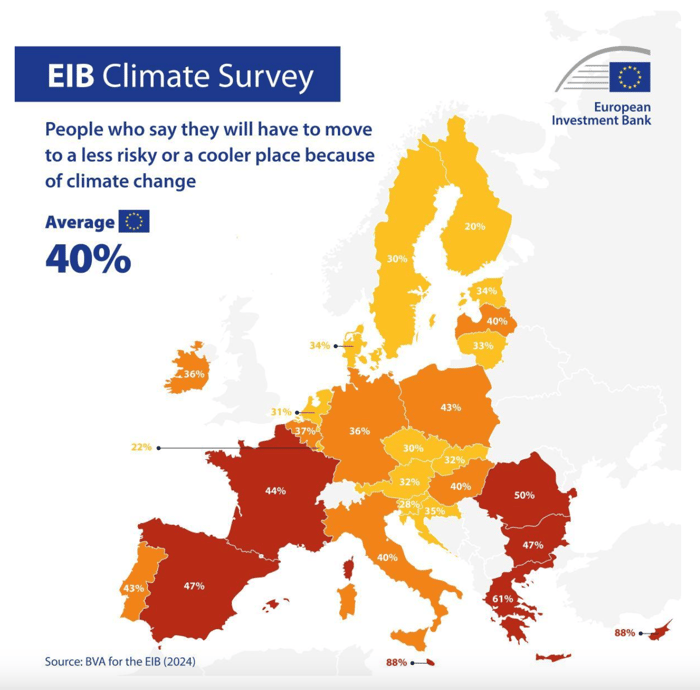More than 9 out of 10 of people polled across the European Union in August 2024 support more action to tackle the effects of climate change, according to the annual Climate Survey commissioned by the European Investment Bank (EIB).


Photo credit: © Matt Howard
Among the challenges facing their countries, respondents ranked climate change second only to the cost of living. Many believe that investing in adaptation now will also prevent higher costs in the future.
Key findings
- 94% of European respondents say it is important for their country to adapt to climate change, while half (50%) say it needs to be prioritised.
- 85% agree that spending on climate adaptation is required urgently to avoid even higher costs in the future.
As natural disasters increase in frequency and severity, the costs of climate change are increasingly apparent. According to a recent report by the European Environment Agency,[1] Europe is currently the fastest-warming continent, with the number of extreme weather events expected to increase as global temperatures rise. A higher number of extreme weather events poses a significant threat to infrastructure and the stability of global water and food supplies, underlining the urgent need for comprehensive climate change adaptation strategies.
“This year we have seen the tragic impact of extreme weather events in Central Europe and most recently in my own country Spain where many have lost their lives and thousands made homeless. From Pakistan to the Caribbean and North Carolina the impact of climate change is being felt across the globe. The survey released today confirms that people know we must act now to adapt to and mitigate the effects of climate change. An orderly transition also makes the most economic sense. Every €1 invested in prevention and resilience saves between €5 and €7 in repairing damage,” EIB President Nadia Calviño said.
“Adapting to climate change is essential, not only to protect lives, but also to seize a significant economic opportunity that will directly support the well-being of Europeans,” said EIB Vice-President Ambroise Fayolle, responsible for climate action and development at the Bank. “By making the necessary investments today, we can protect communities, create quality jobs and strengthen local economies. Acting quickly will increase the resilience of our societies and reduce the long-term costs of inaction. For the EIB Group, adaptation is a key priority. We stand ready to provide financing and advisory services to strengthen the climate resilience of regions, cities and businesses.”
Today, the EIB released its seventh annual Climate Survey, which presents the views of over 24 000 respondents from across the European Union and the United States on the topic of climate change. In the EU, 23 138 people took part in the survey, which was conducted in August 2024.
A pressing issue
European respondents say that climate change is the second-biggest challenge facing their countries, after the rising cost of living.
94% of them recognise the need to adapt to climate change.
- Half of respondents (50%) consider climate adaptation a priority for their country for the coming years. People living in southern European countries[2] are generally more concerned, with 65% considering adaptation to be a priority (15 points above the EU average).
Adaptation to climate change is also seen as an economic opportunity and a long-term investment:
- 86% of Europeans say that investing in climate change adaptation can create jobs and boost the local economy.
- 85% believe that adapting to climate change requires investment now to avoid higher costs later.

The impact of climate change and new habits
European respondents recognise the economic opportunities that climate change adaptation measures present, while first-hand experiences of extreme weather events add to the sense that urgent action is required:
- 80% of EU respondents (89% in southern European countries) have experienced at least one extreme weather event in the last five years. 55% have suffered from extreme heat and heatwaves, 35% have experienced droughts, 34% have seen heavy storms or hail and 18% experienced inland or coastal floods.
Extreme weather events have serious, wide-ranging consequences:
- 68% of European respondents reported having suffered at least one direct consequence of an extreme weather event. 21% were impacted by transport disruptions, 20% by power cuts or energy supply issues and 20% by health problems, while 19% saw forests or natural spaces near their homes destroyed.
Europeans are well aware of the need to adapt:
- 72% of EU respondents (81% in southern European countries) recognise that they will have to adapt their lifestyle due to climate change.
- 35% think they will have to move to a less climate-vulnerable place (whether locally or abroad) to avoid floods, forest fires or other extreme weather events.
- 28% say they will have to move to a cooler region or country.
To be able to adapt to climate change, individuals need the right information. Encouragingly, 71% of Europeans feel they are informed about what they can do to adapt their homes and lifestyles effectively. However, a majority (60%) are unaware of public subsidies or financial incentives to support their efforts.
Adaptation priorities
EU respondents identify the following key priorities for local climate adaptation:
- 42% highlight cooling cities down (by adding tree-lined streets and creating of green spaces)
- 39% cite improving infrastructure; for example, installing better drainage systems, flood barriers, storm shelters or more resilient power grids.
- 38% note the need to educate the public on which behaviours to adopt in order to prevent or respond to problems caused by extreme weather events.
When asked who should pay for climate change adaptations:
- Over a third (35%) think that the costs should be borne by the companies and industries that contribute most to climate change.
- Another third (32%) think everyone should pay equally.
- 15% say that wealthier individuals should bear the costs through higher taxes.
When asked who should receive support first:
- 38% believe that everyone should benefit equally.
- 28% think that the elderly should be prioritised.
- 23% say that people living in high-risk areas should be the first to receive support.

Concerns about who should benefit from adaptation aid go beyond local priorities. A majority (57%) of EU respondents recognise the need to support global adaptation efforts and believe that their country should do more to help the most vulnerable developing nations adapt to the growing impact of climate change.
More information: EIB Survey
[1] Europe is not prepared for rapidly growing climate risks | European Environment Agency's home page (europa.eu).
[2] Spain, Portugal, Italy, Greece, Croatia, Cyprus and Malta.
Published by
 investESG
investESG
 investESG
investESG

